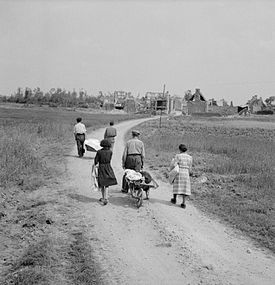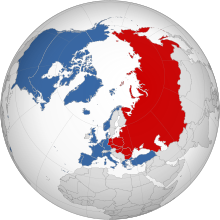178:
47:
107:
301:
entered the war on behalf of North Korea and pushed the US, South Korean, and UN forces back to the 38th parallel. After 3 years of advances and retreats nearly five million people died. To this very day there are still border disputes between the two Koreas.
258:(MAD). The doctrine of MAD prompted leaders on both sides to believe that victory following a full-scale nuclear exchange was simply impossible as the destruction on both sides would be insurmountable. Towards the end of the Cold War, a period of
262:
culminated in the easing of tensions, bans on nuclear testing, and the destruction of various quantities of nuclear stockpiles. The Cold War began to come to an end in 1989 with the overthrow of
Communist governments across Eastern Europe in the
197:
The term "post-war" can have different meanings in different countries and refer to a period determined by local considerations based on the effect of the war there. Some examples of post-war events are in chronological order:
249:
for the Soviet Union. Although both sides did not fight each other directly, both engaged through various proxy wars. At the height of the cold war, both superpowers manufactured and deployed thousands of
254:
to target each other's key economic, military, and political centers. Each superpower's buildup and demonstration of nuclear strike capabilities lead to an unofficial military doctrine known as
334:
that racial segregation in public schools was unconstitutional. By the end of the 1950s, fewer than 10 percent of Black children in the South were attending integrated schools.
475:
at its narrowest, usually with precise or contextual qualifiers, it is the war's direct aftermath; this prompted social solidarity, unprecedented high capital, particularly
385:
388:
due to the condition and many thought the war was pointless. Finally after many protests the United States slowly withdrew from
Vietnam due to public backlash.
580:
642:
396:
Considering the post-war era as equivalent to the Cold War era, post-war sometimes includes the 1980s, putting the end at 26 December 1991, with the
57:
422:
culturally, is a term commonly used in the arts and architecture, as it is worldwide. It is primarily and especially before the ascendancy of
515:. These set a social norm for a majority of out-of-town journeys in private rather than public transport and private housing preferred over
297:
joined the war on behalf of South Korea, expelled the North Korean invasion, and then invaded and nearly captured North Korea. In response,
504:
321:
35:
512:
544:
516:
373:
624:
695:
361:
325:
293:, North Korea coordinated a series of surprise attacks against strategic points between the 38th parallel. Soon US-led
91:
430:" "1960s" movements. Its end is complex due to its archetypes of the 1950s contrasting with leading developments in
400:. The 1990s and the 21st century are sometimes described as part of the post-war era, but the more specific phrase "
365:
500:
492:
413:
397:
268:
17:
434:
genres and in popular art, becoming to some audiences mainstream, before 1960. Its movements such as continued
584:
446:, dominating as the decade wore on. Later resurgences to its stress on quite basic forms were common such as
646:
435:
549:
443:
330:
146:
or interbellum, when a war between the same parties resumes at a later date (such as the period between
377:
298:
255:
690:
163:
404:" is often appended to distinguish the period running from the fall of Communism up to the present.
685:
536:
324:
throughout the United States, especially in the south where many could not even vote. In 1954, the
73:
667:
488:
294:
560:
401:
317:
311:
519:, continued (with minor abatement) through alternating governments of the next two decades.
227:
167:
372:
insurgents in South
Vietnam adapting to guerrilla fighting and ambush tactics against the
8:
264:
554:
469:
465:
431:
217:
606:
511:
enabled and encouraged from the late 1950s such as under the four-successive leader
581:"The Netherlands History – the Netherlands Travel Guide – Budget Travel – Let's Go"
177:
65:
531:
476:
224:
143:
119:
56:
deal primarily with the United States and United
Kingdom and do not represent a
484:
480:
461:
251:
151:
679:
447:
427:
357:
349:
220:
69:
246:
238:
230:
139:
508:
496:
343:
290:
286:
242:
190:
150:
and World War II). By contrast, a post-war period marks the cessation of
147:
451:
381:
280:
213:
106:
259:
439:
369:
625:"AEC Lorries in the post war years 1945–1979 book | #248690820"
207:
31:
423:
271:
in 1991, leaving the United States the world's sole superpower.
353:
111:
138:. The term usually refers to a varying period of time after
234:
186:
115:
539:(not a synonym for interwar when referring to World War I)
407:
285:
On 25 June 1950, after years of tension between communist
172:
134:
period is the interval immediately following the end of a
157:
135:
380:. Vietnam was one of the first wars to be broadcast to
142:, which ended in 1945. A post-war period can become an
212:
The Cold War was a geopolitical conflict between the
460:
at its broadest, is the period from the election of
348:The Vietnam War was fought between the communist
677:
27:Period shortly after a war, usually World War II
442:were overtaken by the, definitively raucous,
54:The examples and perspective in this article
468:in the 1979 general election, the so-called
384:. Many American civilians and soldiers were
110:A French family returns to their village,
491:all amid relative austerity particularly
92:Learn how and when to remove this message
267:which was followed shortly after by the
176:
105:
408:Post World-War II in the United Kingdom
364:. This war is especially brutal due to
173:Chronology of the post–World War II era
36:Postwar: A History of Europe Since 1945
14:
678:
316:In the 1950s, African Americans faced
158:Post-World War II in the United States
545:Aftermath of the September 11 attacks
356:, and the Eastern Bloc and China and
464:in 1945 general election to that of
40:
487:, the founding and endowing of the
360:supported by the United States and
24:
513:Conservative government, 1957–1964
25:
707:
306:Civil rights movement (1954–1968)
118:, which was completely destroyed
643:"The Post-War Years 1945 – 1960"
479:taxation, internationalism, the
45:
30:For the 2006 M. Ward album, see
668:The Post War Economy: 1945–1960
398:dissolution of the Soviet Union
391:
366:North Vietnamese regular forces
352:supported by the Soviet Union,
269:dissolution of the Soviet Union
241:for the United States, and the
233:, and their respective allies:
661:
635:
617:
599:
573:
13:
1:
566:
507:, technological advances and
457:politically and economically
185:in the northern hemisphere:
7:
525:
444:counterculture of the 1960s
414:Postwar Britain (1945–1979)
331:Brown v. Board of Education
68:, discuss the issue on the
10:
712:
611:soapbox.websitetoolbox.com
411:
378:United States Armed Forces
341:
309:
278:
256:mutual assured destruction
205:
161:
29:
696:Aftermath of World War II
374:South Vietnamese military
164:Aftermath of World War II
34:. For the 2005 book, see
418:In Britain, "post-war":
223:, the authoritarian and
489:National Health Service
338:Vietnam war (1955–1975)
275:Korean War (1950–1953)
194:
123:
328:ruled unanimously in
312:Civil rights movement
295:United Nations forces
180:
109:
202:Cold War (1947–1991)
168:Contemporary history
74:create a new article
66:improve this article
265:Revolutions of 1989
555:Reconstruction era
470:post-war consensus
386:opposed to the war
218:liberal democratic
195:
124:
587:on 22 August 2011
561:Post–Cold War era
466:Margaret Thatcher
432:avant-garde music
426:and overlapping "
402:Post–Cold War era
183:aligned countries
102:
101:
94:
76:, as appropriate.
16:(Redirected from
703:
691:Aftermath of war
670:
665:
659:
658:
656:
654:
645:. Archived from
639:
633:
632:
621:
615:
614:
603:
597:
596:
594:
592:
583:. Archived from
577:
497:capital taxation
228:Marxist–Leninist
189:in blue and the
97:
90:
86:
83:
77:
49:
48:
41:
21:
711:
710:
706:
705:
704:
702:
701:
700:
686:Post-war period
676:
675:
674:
673:
666:
662:
652:
650:
649:on 5 April 2020
641:
640:
636:
623:
622:
618:
607:"Unknown Forum"
605:
604:
600:
590:
588:
579:
578:
574:
569:
532:Interwar period
528:
505:global recovery
503:, faded due to
495:. Hardships in
416:
410:
394:
346:
314:
289:and democratic
283:
252:nuclear weapons
210:
175:
170:
160:
144:interwar period
122:, 18 July 1944.
120:during fighting
114:, northwest of
98:
87:
81:
78:
63:
50:
46:
39:
28:
23:
22:
18:Post-war period
15:
12:
11:
5:
709:
699:
698:
693:
688:
672:
671:
660:
634:
616:
598:
571:
570:
568:
565:
564:
563:
558:
552:
547:
542:
541:
540:
527:
524:
523:
522:
521:
520:
517:public housing
485:British Empire
481:decolonization
473:
462:Clement Attlee
455:
428:post-modernist
412:Main article:
409:
406:
393:
390:
342:Main article:
340:
339:
318:discrimination
310:Main article:
308:
307:
299:Chinese forces
279:Main article:
277:
276:
206:Main article:
204:
203:
174:
171:
159:
156:
152:armed conflict
100:
99:
60:of the subject
58:worldwide view
53:
51:
44:
26:
9:
6:
4:
3:
2:
708:
697:
694:
692:
689:
687:
684:
683:
681:
669:
664:
648:
644:
638:
630:
626:
620:
612:
608:
602:
586:
582:
576:
572:
562:
559:
556:
553:
551:
548:
546:
543:
538:
535:
534:
533:
530:
529:
518:
514:
510:
506:
502:
498:
494:
490:
486:
482:
478:
474:
471:
467:
463:
459:
458:
456:
453:
449:
448:postmodernism
445:
441:
437:
436:functionalism
433:
429:
425:
421:
420:
419:
415:
405:
403:
399:
389:
387:
383:
379:
375:
371:
367:
363:
359:
358:South Vietnam
355:
351:
350:North Vietnam
345:
337:
336:
335:
333:
332:
327:
326:Supreme Court
323:
319:
313:
305:
304:
303:
300:
296:
292:
288:
282:
274:
273:
272:
270:
266:
261:
257:
253:
248:
244:
240:
236:
232:
229:
226:
222:
221:United States
219:
215:
209:
201:
200:
199:
192:
188:
184:
179:
169:
165:
155:
153:
149:
145:
141:
137:
133:
129:
121:
117:
113:
108:
104:
96:
93:
85:
75:
71:
67:
61:
59:
52:
43:
42:
37:
33:
19:
663:
651:. Retrieved
647:the original
637:
628:
619:
610:
601:
589:. Retrieved
585:the original
575:
417:
395:
392:Cold War era
347:
329:
315:
284:
247:Eastern Bloc
239:Western Bloc
231:Soviet Union
211:
196:
182:
140:World War II
131:
127:
125:
103:
88:
79:
55:
557:of the U.S.
509:consumerism
477:inheritance
344:Vietnam War
322:segregation
291:South Korea
287:North Korea
243:Warsaw Pact
191:Warsaw Pact
148:World War I
680:Categories
629:Worthpoint
567:References
550:Postbellum
452:minimalism
382:television
281:Korean War
214:capitalist
162:See also:
154:entirely.
501:rationing
499:, and of
493:rationing
440:brutalism
370:Viet Cong
225:Communist
82:July 2024
70:talk page
526:See also
376:and the
245:and the
237:and the
208:Cold War
128:post-war
64:You may
32:Post-War
653:16 June
591:16 June
537:Pre-war
483:of the
424:Pop Art
260:détente
132:postwar
193:in red
362:SEATO
354:China
112:Buron
72:, or
655:2011
593:2011
450:and
438:and
368:and
320:and
235:NATO
216:and
187:NATO
181:The
166:and
116:Caen
136:war
130:or
682::
627:.
609:.
126:A
657:.
631:.
613:.
595:.
472:.
454:.
95:)
89:(
84:)
80:(
62:.
38:.
20:)
Text is available under the Creative Commons Attribution-ShareAlike License. Additional terms may apply.

